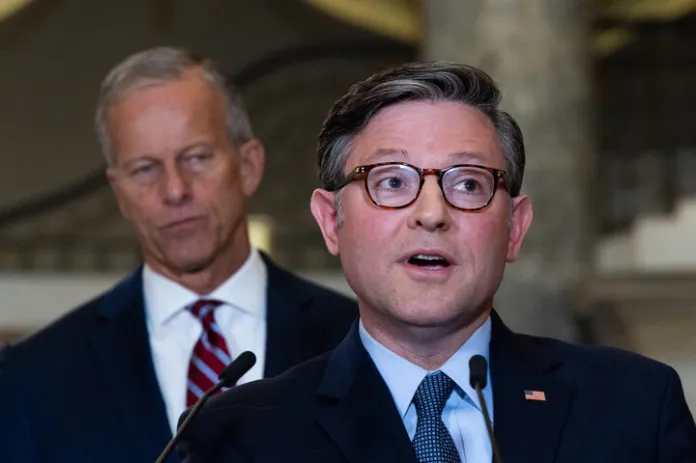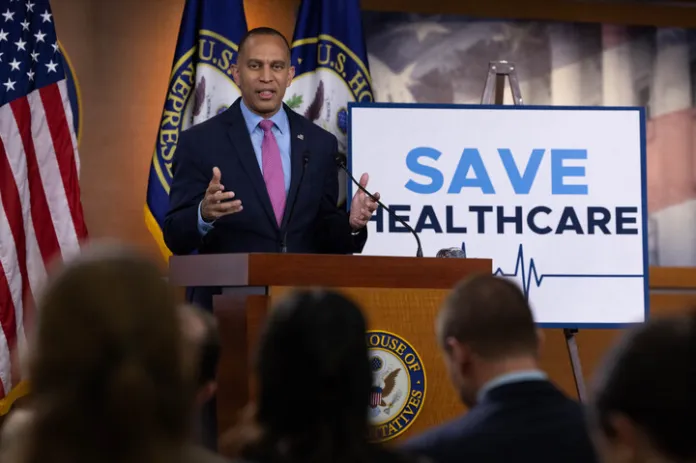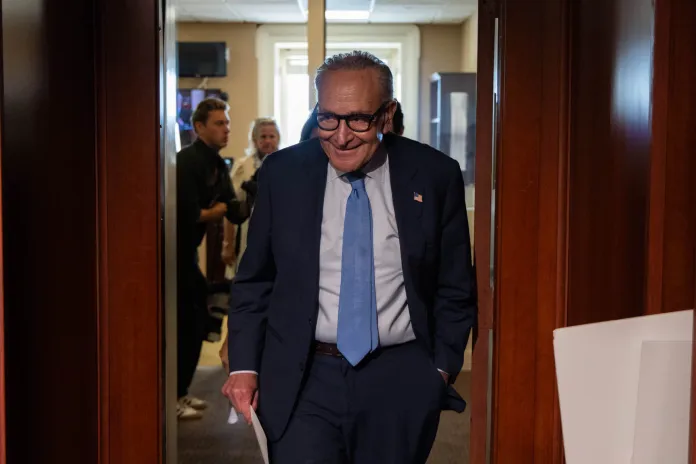Speaker Mike Johnson (R-LA) will keep the House in recess for a third straight week to put maximum pressure on the Senate to pass its plan to end the government shutdown.
House GOP leadership plans on holding a member call at 11 a.m. Saturday to talk about the next steps, the Washington Examiner learned.
“The House will come back into session and do its work as soon as Chuck Schumer allows us to reopen the government,” Johnson said at a press conference Friday before it was announced they would remain in recess. “That’s plain and simple.”

The Oct. 1 shutdown means an estimated 750,000 federal workers are furloughed, and the Trump administration threatens permanent layoffs. Essential workers and United States service members continue to work but without pay.
As Johnson keeps Republicans at home, House Minority Leader Hakeem Jeffries (D-NY) told reporters Friday that he would bring House Democrats back to the Capitol to show they are ready to strike a deal to reopen the government. Democrats spent the last week in Washington holding many press conferences and crowding the House floor to blame Republicans in power for the shutdown.

“House Republicans continue to be on vacation spread out across the country and the world, and this makes no sense,” Jeffries said Friday, claiming Republicans have “no interest in reopening it [the government].”
The federal government shut down on Wednesday after the Senate failed to pass a House GOP continuing resolution to fund the government through Nov. 21.
“As we’ve discussed over and over again, we did our work,” Rep. Mike Haridopolos (R-FL) told reporters Friday after the House announced it would not be coming back.
Johnson has used the recess period to pressure Democrats in the upper chamber to pass the bill without changes. One senior House GOP staffer told the Washington Examiner that Johnson’s decision is “McConnell-esque,” referring to longtime former Senate Majority Leader Mitch McConnell (R-KY). The staffer went on to say that this tactic could be “brilliant” or “will hamstring us.”
The staffer pointed out that even if the decision is risky, “people have counted out Johnson every single time, but he always finds a way to win,” saying he “doesn’t get enough credit for how effective he is.”
The GOP short-term funding bill passed the House, but failed four times in the Senate to reach the 60-vote threshold. Democrats have also put forth their own plan to keep the government open through Oct. 31 that includes various pet projects that Republicans oppose, including permanently extending expiring Obamacare tax credits, rolling back Medicaid cuts in the One Big Beautiful Bill, and restoring federal aid to NPR and PBS public radio and TV stations. The Senate rejected that proposal four times as well.
Senate Minority Leader Chuck Schumer (D-NY) wants to keep enough of his Democratic caucus in line to force Republicans to strike a deal that meets some of his healthcare demands. So far, only three of the eight Democrats needed have backed the GOP plan.
Schumer claimed on Friday that the real reason Johnson wants to keep the House out of session is to avoid a likely vote on releasing the files related to deceased sex offender Jeffrey Epstein.
“We just heard that Speaker Johnson said the House is out again. Johnson and House Republicans care more about protecting the Epstein files than protecting the American people,” Schumer said.

Earlier this year, Rep. Thomas Massie (R-KY) introduced a discharge petition to try to force a vote for a full release of the Epstein files. However, it was one signature short of forcing Johnson to put Massie’s Epstein transparency bill on the House floor for a vote.
DEMOCRATS TIE JOHNSON’S DELAY OF GRIJALVA SWEARING-IN TO EPSTEIN VOTE
After Democrats won last week’s special election in Arizona, Rep.-elect Adelita Grijalva is expected to sign the Epstein discharge petition and reach 218 necessary signatures to compel floor action. Johnson has delayed the swearing-in of Grijalva, a move some Democrats have said is due to her support of the petition to release files related to Epstein. If the House does not come back, that could potentially delay her swearing in even further.
President Donald Trump, House GOP leadership, and the Department of Justice have sought to move past the Epstein files following the public fallout from the department’s announcement in July that it had no plans to make any further documents available and affirmed that Epstein died by suicide in 2019 while awaiting trial on charges related to the sex trafficking of minors. This recess extension gives the speaker some reprieve to deal with the discharge petition at a later date.
